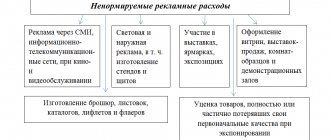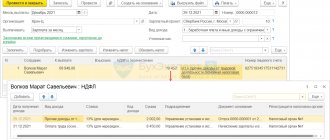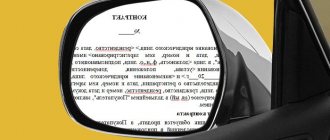Recently, the procedure for reflecting VAT in advance reports from checks has undergone many adjustments. In this regard, the already not very simple processes of tax accounting and reporting have become more complicated. Changes constantly being made to tax legislation create no less problems than many controversial issues regarding value added tax. One of them is how to take into account spent advances when calculating VAT.
Only if the report is completed correctly by the reporting person will the tax be accepted for deduction. However, the problem lies in the ambiguous interpretation of documentation requirements by executive and judicial authorities. Therefore, you should understand this issue in advance.
How to take into account VAT in an advance report
Expenditures on accountable funds are usually made through cash settlements. The difficulties in reflecting VAT are due precisely to this fact. The Tax Code of the Russian Federation contains instructions in this regard. The basis for deducting value added tax is an invoice.
This document is drawn up when making settlements with legal entities. This is especially true for situations with non-cash payments. Another common option is when the accountable person receives GWS as an individual, so an invoice is not required to be issued. This is relevant in cases of settlements with retailers and small companies.
It is much easier to take into account the amount of VAT if an invoice is issued. The amount of tax is indicated in the transactions as input VAT, and then taken for deduction.
In accounting and tax accounting, two options are adopted to reflect value added tax.
The first method suggests displaying VAT in accordance with the agreed advance report. In this case, the wiring looks like this:
| Debit 20, 26, 44, 91 | Credit 71 | Amount according to advance report |
| Debit 19 | Credit 71 | VAT on expenses incurred through an accountable entity |
| Debit 68 | Credit 19 | VAT is deductible |
The second option allows you to post taxes using payment documents.
| Debit 20, 26, 44, 91 | Credit 60 | Amount of expenses according to payment documents |
| Debit 19 | Credit 60 | The VAT amount is reflected in payment documents |
| Debit 60 | Credit 71 | The advance report is approved |
| Debit 68 | Credit 19 | VAT is deductible |
The exact list of situations when the amount of the submitted value added tax can be classified as an expense is indicated in paragraph 2 of Article 170 of the Tax Code of the Russian Federation. However, cases of absence of documents confirming the right to deduct are not indicated in this list.
You can write off value added tax even if there is no invoice. However, in this case there is a risk of claims from the tax authorities.
Astral.Report 5.0 will help you understand the issues of submitting reports in digital format. The service has already prepared forms for the most popular funds and authorities.
VAT on cash receipts for deduction
Home → Articles → VAT on cash receipts for deduction
To confirm travel expenses, the employee attached to the advance report a cash receipt issued by the bus station, in which the amount of VAT was allocated. There is no bus ticket. The check contains details that correspond to the strict reporting form (series, number, date, route, date and time of departure and arrival, full name and passport details of the employee, TIN). Is it possible to deduct input VAT based on a cash receipt?
According to paragraph 1 of Art. 172 of the Tax Code of the Russian Federation, tax deductions of “input” VAT are made on the basis of invoices issued by sellers when the taxpayer purchases goods (work, services), property rights, or on the basis of other documents in the cases provided for in paragraphs. 3, 6-8 tbsp. 171 Tax Code of the Russian Federation. Clause 7 of Art. 171 of the Tax Code of the Russian Federation provides, in particular, for the specifics of deducting VAT amounts paid by employees of an organization as part of travel expenses, including travel expenses to and from the place of business travel (see also letters of the Ministry of Finance of Russia dated February 14, 2017 No. 03-07-11/8245, dated January 24, 2017 No. 03-07-11/3094).
In accordance with clause 12 of the Regulations on the specifics of sending employees on business trips, approved by Decree of the Government of the Russian Federation dated October 13, 2008 No. 749, travel expenses to the place of business trip and back to the place of permanent work include expenses for travel by public transport, respectively, to the station, pier, airport and from the station, pier, airport, if they are located outside the populated area, in the presence of documents (tickets) confirming these expenses, as well as payment for services for issuing travel documents and providing bedding on trains.
Thus, VAT amounts paid by an employee of an organization when purchasing a bus ticket for travel to and from the place of business travel can be deducted on the basis of documents other than an invoice. At the same time, Chapter 21 of the Tax Code of the Russian Federation does not disclose the list of such documents.
At the same time, clause 18 of the Rules for maintaining a purchase book used in VAT calculations, approved by Decree of the Government of the Russian Federation dated December 26, 2011 No. 1137 (hereinafter referred to as the Rules for maintaining a purchase book), it is established that when purchasing services for transporting employees to a place of business travel and back in the purchase book, invoices or strict reporting forms (hereinafter referred to as SRF) filled out in the prescribed manner or their copies with the VAT amount highlighted in a separate line, issued to the employee and included by him in the business trip report, are registered. At the same time, the specified rules do not provide for the possibility of registering cash receipts in the purchase book.
At the same time, we believe that this circumstance cannot unambiguously indicate that in the absence of an invoice or BSO, the taxpayer is deprived of the right to deduct the amount of VAT on travel expenses for a business trip employee, because the Rules for maintaining a purchase book cannot establish the procedure for applying tax deductions , different from that provided for in Chapter 21 of the Tax Code of the Russian Federation (clause 1 of Article 4 of the Tax Code of the Russian Federation), which does not limit the list of documents that are the basis for the application of deductions in such cases, exclusively to invoices and BSO.
In situations similar to the one under consideration, specialists from the Ministry of Finance of Russia and the Federal Tax Service of Russia indicated that the basis for deducting VAT in relation to travel expenses for a business trip employee are travel tickets. For example, the letter of the Ministry of Finance of Russia dated February 26, 2016 No. 03-07-11/11033 explains that when purchasing train tickets for the travel of organization employees to the place of business trip and back, the amount of VAT allocated as a separate line in the train ticket is deducted. Tax department specialists also proceeded from the fact that when purchasing services for transporting employees to and from a business trip, deductions are made on the basis of an air ticket, in which the tax amount is highlighted in a separate line, and, accordingly, an air ticket with the VAT amount highlighted in a separate line is registered in the purchase book , issued to the employee and included by him in the report on the business trip (letter of the Federal Tax Service of Russia dated May 21, 2015 No. GD-4-3 / [email protected] ). At the same time, there is no direct indication that such documents must be strict reporting forms in the letters cited.
The decisions of the Fifteenth Arbitration Court of Appeal dated January 16, 2013 No. 15AP-13829/12, FAS of the Ural District dated March 2, 2010 No. F09-1093/10-S2 in case No. A50-23982/2009 similarly indicate that the deduction of VAT when applying p 7 tbsp. 171 of the Tax Code of the Russian Federation can be carried out on the basis of invoices issued by sellers when the taxpayer purchased goods (work, services), or on the basis of other documents (for example, air tickets).
In the analyzed situation, when paying for bus travel services, a posted employee was given a cash receipt with the allocated amount of VAT, which, as we understand, also contains the mandatory ticket details provided for in Appendix No. 1 to the Rules for the transportation of passengers and baggage by road and urban ground electric transport, approved by Decree of the Government of the Russian Federation dated February 14, 2009 No. 112 (clause 43 of these rules). By virtue of Part 3 of Art. 20 of the Federal Law of November 8, 2007 No. 259-FZ “Charter of Automobile Transport and Urban Ground Electric Transport”, such a cash receipt is equivalent to a ticket certifying the conclusion of a contract for the carriage of a passenger. We also note that a ticket containing the details provided for in the specified application, subject to cash payments and (or) payments using payment cards without the use of cash register systems in the case of providing services to the population, is a BSO on the basis of paragraphs. 2, 3, 4, 5.1 Regulations on the implementation of cash payments and (or) payments using payment cards without the use of cash register equipment, approved by Decree of the Government of the Russian Federation dated May 6, 2008 No. 359.
Thus, we believe that the organization in the situation under consideration is not deprived of the right to claim a VAT tax deduction on the basis of its cash receipt, which is also a bus ticket. The above position is also supported by clause 7 of Art. 3 of the Tax Code of the Russian Federation, due to which doubts and ambiguities in paragraph 1 of Art. 172 of the Tax Code of the Russian Federation regarding documents other than invoices, which are the basis for deducting VAT amounts on business trip expenses, must be interpreted in favor of the taxpayer.
At the same time, it is possible that the organization’s above point of view will have to be defended, including in court.
In this regard, we note that the Presidium of the Supreme Arbitration Court of the Russian Federation, in Resolution No. 17718/07 dated May 13, 2008, indicated the possibility of deducting VAT on the basis of cash receipts, upon issuance of which the obligation to issue invoices is considered fulfilled on the basis of clause 7 of Art. 168 Tax Code of the Russian Federation. Similar decisions are made by lower courts (see, for example, decisions of the Arbitration Court of the North Caucasus District dated 04/28/2017 No. F08-2516/17 in case No. A15-1057/2016, FAS North-Western District dated 09/03/2013 No. F07-6570 /13 in case No. A56-4764/2013, FAS Moscow District dated 08.23.2011 No. F05-6832/11, FAS West Siberian District dated 07.20.2009 No. F04-4134/2009).
Answer prepared by: Natalya Vakhromova, expert of the GARANT Legal Consulting ServiceResponse quality control: Dmitry Ignatiev, reviewer of the GARANT Legal Consulting Service, Candidate of Economic Sciences
Latest news of the digital economy on our Telegram channel
| Do you need to transfer fiscal data to the Federal Tax Service? The Electronic Express company is a fiscal data operator and is included in the register of OFD of the Federal Tax Service of Russia. Connect the cash register to the OFD >> |
How to conduct an advance report if VAT is highlighted in the check, in the absence of an invoice
It is quite common for the accountable person, when purchasing with the advance money issued, to decide not to issue an invoice from the seller. If the party selling the goods is among the VAT payers, such a document from the company that accepted the report without SF is sufficient, while retaining the right to deduct value added tax.
The massive transition to cash register equipment with online access until 2022 has necessitated the need to highlight the tax amount on the receipt as a separate line. Therefore, the question of companies being able to receive a deduction even without an invoice should be removed. In reality, everything is not so simple. The Tax Service and the Ministry of Finance interpret the situation differently.
The text of Article 21 of the Tax Code of the Russian Federation mentions that the taxpayer has the right to receive clarifications from the Ministry of Finance regarding the application of tax laws. Moreover, they must be given in writing. VAT can be deducted only if a specific list of documents is available. Only in this case does the right to deduct tax on the advance report appear. The authority bases its judgments on Articles 171 and 172 of the Tax Code of the Russian Federation.
The above list includes:
- invoices are the main document that allows you to receive VAT deductions in advance reports from checks;
- declaration issued at customs;
- other types of papers indicating payment of tax directly to the budget;
- documentation that allows you to verify that the tax has been paid by the tax agent.
A separate line includes papers on the transfer of assets. This option is considered in the case of acquiring property for the purpose of contributing to the authorized capital.
Other situations, as indicated by the Ministry of Finance in the issued Letter No. 03-07-11/3094, require the mandatory execution of an invoice in order to accept value added tax for subsequent deduction. A cash receipt may be sufficient: this is a primary document that can become the basis for an organization to account for expenses incurred. Many courts adhere to this position when making decisions. In its Resolution, the Supreme Arbitration Court indicated that in a retail purchase situation, a cash receipt can become an alternative to an invoice. Therefore, VAT is allowed to be deducted. However, such a situation is considered exceptional - you should adhere to the regulated rules.
It is also important to note that non-deductible value added tax is not suitable for inclusion in expenses when calculating income tax. This is regulated by Article 170 of the Tax Code of the Russian Federation. At the same time, there are no strict restrictions. The Ministry of Finance in its letter emphasizes that this normative act is of an explanatory and recommendatory nature.
Regulatory regulation
On the basis of one check, without an invoice, a VAT deduction is not provided (Letter of the Ministry of Finance dated September 16, 2019 N 03-07-14/71091, Letter of the Ministry of Finance dated June 25, 2020 N 03-07-09/54634).
For VAT deduction you need (clause 1 of Article 172 of the Tax Code of the Russian Federation):
- incoming SF in the general case;
- document for payment of VAT when importing goods;
- confirmation of VAT payment by the tax agent;
- other documents, for example, BSO with an allocated amount of VAT on travel expenses, etc. (clauses 2.1, 3, 6 - 8 of Article 171 of the Tax Code of the Russian Federation).
VAT allocated on the cash receipt if there is no invoice:
- cannot be accepted for deduction (Letter of the Ministry of Finance dated November 27, 2019 N 03-07-11/92132);
- must be written off as expenses not taken into account for income tax (Letter of the Ministry of Finance dated 08/13/2018 N 03-07-11/57127, Letter of the Ministry of Finance dated 12/28/2017 N 03-07-11/87948).
VAT on travel expenses:
- accepted for deduction for paid expenses (clause 7 of Article 171 of the Tax Code of the Russian Federation);
- cannot be postponed for 3 years (clause 1 of article 172 of the Tax Code of the Russian Federation, clause 18 of the Rules for maintaining a purchase ledger, Letter of the Ministry of Finance of the Russian Federation dated July 14, 2020 N 03-07-14/61018).
Should I highlight VAT in the advance report?
Data regarding spent accountable funds should be prepared as an advance report. In this case, the document is drawn up on the form regulated by the State Statistics Committee, called AO-1. However, the company is given the opportunity to draw up its own reporting form. The main thing is that it contains a set of mandatory details.
One more point - such a form must be certified by a local regulatory act, that is, an order must be issued.
There are no strict requirements regarding the completion of the expense report form. The basic rule is compliance with the general principles of office work. The form requires that the allocated VAT be indicated in the report.
The front and back sides of the form contain columns where accounting entries should be made indicating correspondence of accounts. The VAT amount must be allocated for posting to account 19.
Purchase of an electronic ticket by an employee for cash on passenger transport
The forms of electronic travel documents (tickets) for railway transport are approved by Order of the Ministry of Transport of Russia dated August 21, 2012 N 322 (hereinafter referred to as Order N 322).
According to clause 2 of the Order, the control coupon of an electronic travel document (ticket) (extract from the automated control system for passenger transportation on railway transport) is a document of strict accountability and is used for organizations and individual entrepreneurs to carry out cash payments and (or) payments using payment cards without use of cash register equipment.
Therefore, the rationale for applying a deduction for an electronic ticket on passenger transport is similar to the situation associated with the purchase of an electronic ticket.
Taking into account the above, we can conclude that if in an electronic passenger ticket printed on paper, the amount of VAT is highlighted as a separate line, then the tax deduction is legal.
In this case, the control coupon (extract from the automated system) with the VAT amount highlighted in a separate line is registered in the purchase book and is the basis for accepting this VAT amount for deduction.








